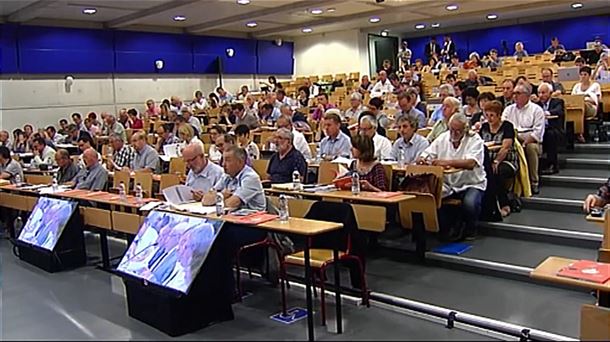On 23 June, the Basque Agglomeration Community, the only official institution regrouping the whole Northern Basque Country, took a step of high symbolic value, officially declaring Basque a native language. A large majority, 145 for, 18 against, and 22 abstentions backed the decision. Besides recognizing Basque, it acknowledges Occitan, spoken in a handful of towns in the Northern Basque Country.
The Basque Community’s stance puts some strain on the French Jacobin linguistic model. For the first time in the last 229 years, an institution requests an official status for Basque. While it holds true that lately some progress has been made to advance Basque, e.g. bilingual signposting, bilingual schools in the public network (also “D model” linguistic immersion), or the establishment in 2004 of the Basque Public Institution (EEP), to cite a few, the demand for an official Basque language breaks new ground. The 2nd article of the French Constitution establishing French as the only acceptable linguistic standard poses a permeable barrier, an insurmountable stumbling block that prevents any other minority languages in the Hexagone from holding a decent status. A number of political agents have demanded a change to that article. The Government of Corsica, for instance, reasserted not long ago its petition to do so. However, as it happens, France has not confirmed the European Charter for Minority Languages, and the prospect of changing the Constitution in the short run is not auspicious.
The Basque Agglomeration Community, established in 2017, is a community articulating all the municipalities in the Northern Basque Country. It has scant attributions, less than the Parliament of Corsica. However, two of them stand out as very relevant for nation building, i.e. language policy and cross-border relations. Beñat Arrabit, head of the Public Institution for Basque language, holds that Britons, Catalans and Corsicans should get together when it comes to demand official status for Basque in Paris. Arrabit is well aware that any linguistic scheme will be doomed unless officiality is addressed, but has equally stated that new steps forward are in place in several domains. The Basque Community is intent on fostering Basque, including an enhanced budget towards that end, providing for new steps in communication, as well as encouraging the learning of Basque among local civil servants who wish to do so.
The resolution passed in favour of Basque states, among others, that it will provide for “bilingual services in all aspects of life, so that those inhabitants who wish to do so can use and transmit Basque”, “in order to encourage attitudes and dynamics in favour of Basque in every aspect of life” and “make a listing of the juridical obstacles found, defining the measures aimed at handling them”.
The latest sociolinguistic survey (2016) reveals that 21% of the population in the Northern Basque Country can speak the language nowadays, with a further 9% of passive bilinguals. While the most Basque speaking segment lies with the older population (28%), Basque shows an important increase among the youths, thanks to Basque language schools and bilingual public schools. 17% of the youths are Basque speakers, 7 points higher than 20 years ago.

